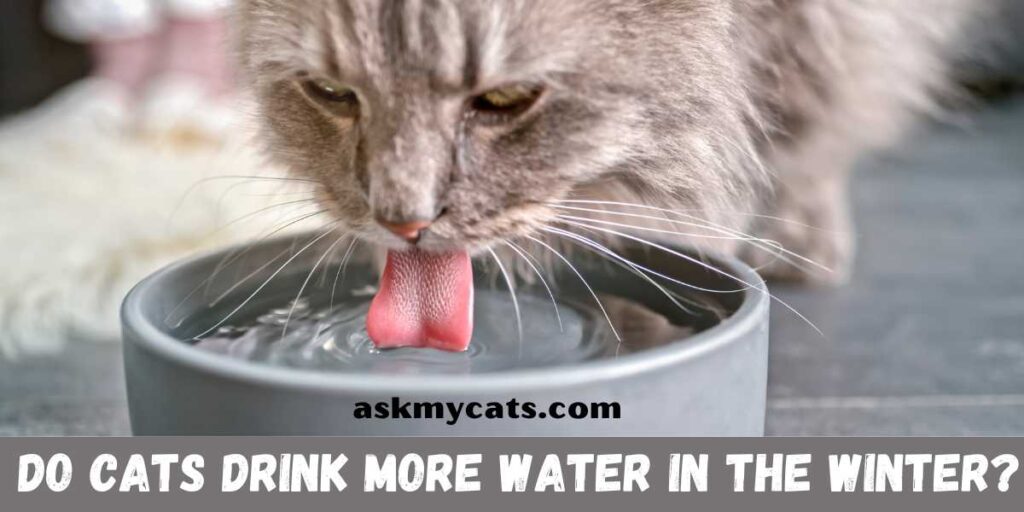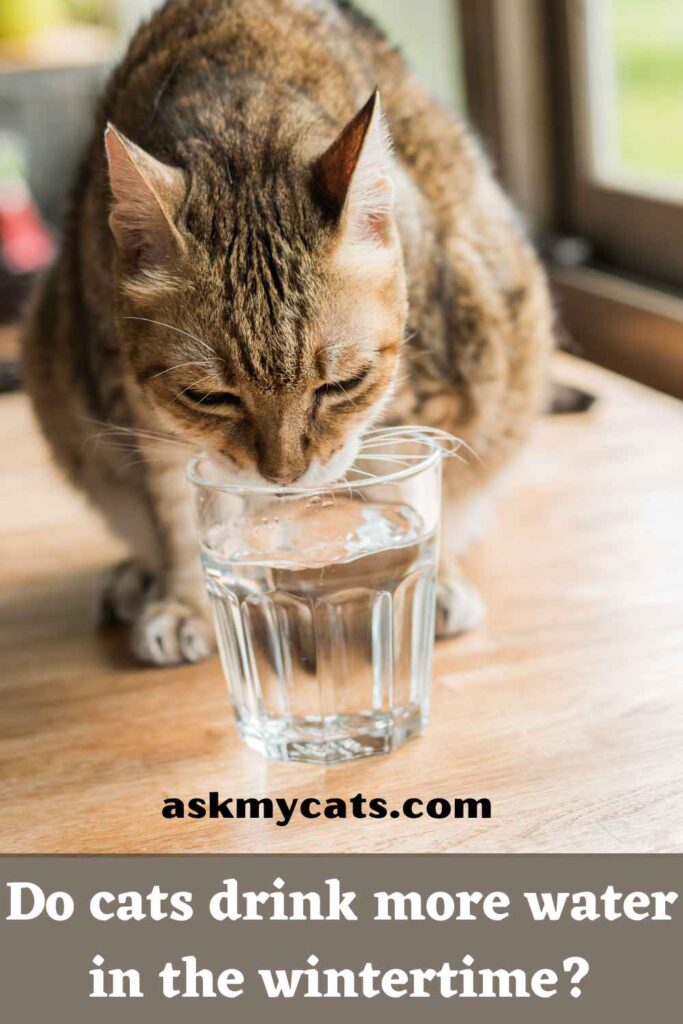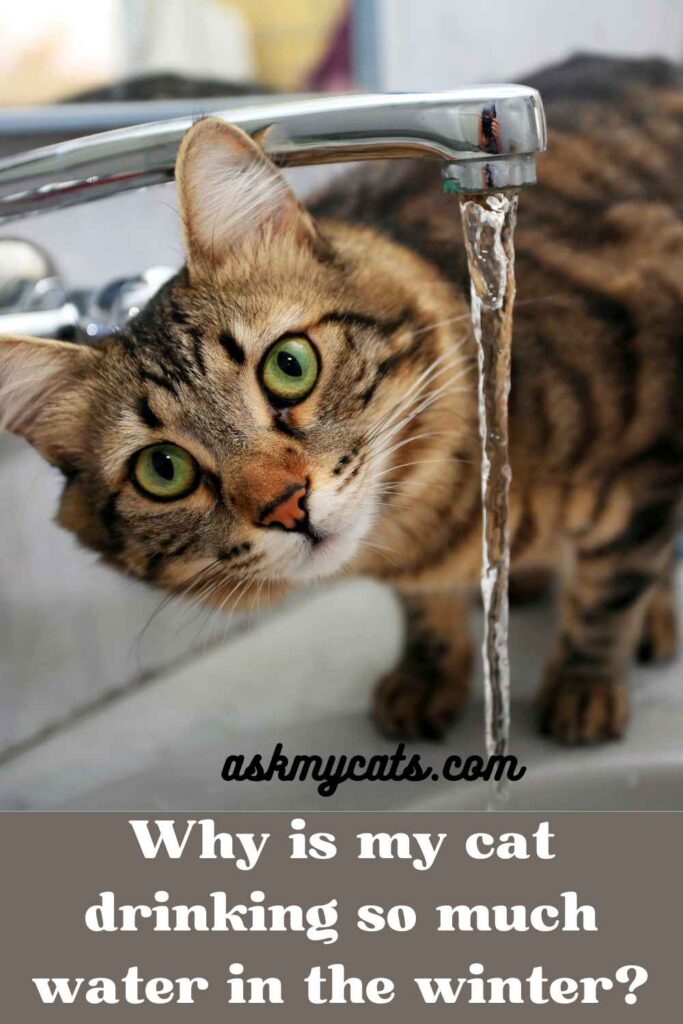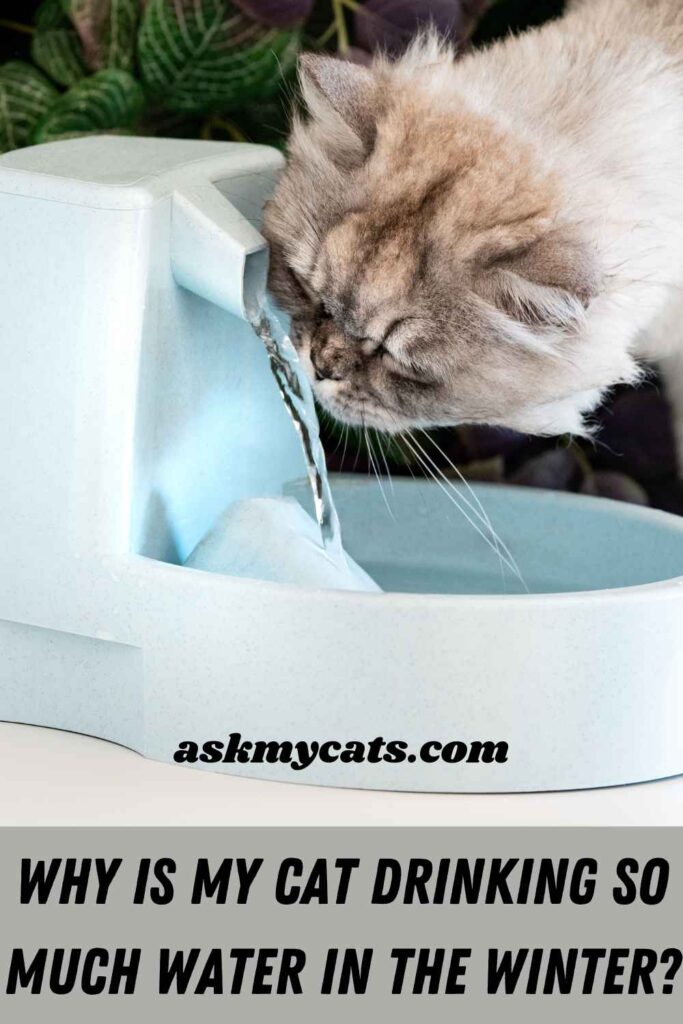As a kid, in winter I always used to see my parents making a fuss about how much water I drink because my mother always used to say, “in winter, everything is drier even our gut.” If you have observed, you may have seen that even if our appetite slightly increases in winter, our thirst declines.
Something similar is also observed in cats. Their thirst also declines as the weather gets chilly. This is because of the dry weather.
It is not unusual to see prominent cases of dehydration around us, not only in cats but also in humans. This weather leads to an overall decrease in the thirst of all animals.
Are you wondering if your feline friend is drinking enough water during the colder months? It’s a common concern for cat owners, as cats can be picky drinkers to begin with.
But don’t worry, we’re here to give you the scoop on whether cats drink less water in the winter and what you can do to make sure your kitty stays hydrated. So grab a warm cup of cocoa, curl up with your cat, and let’s dive in!
Key Takeaways
- Cats drink less water in the winter compared to the summer.
- Cats may not realize they are dehydrated in winter as they don’t feel thirsty
- Several factors can affect cats’ water intake in the winter, such as lower humidity levels, colder temperatures, changes in diet, and behavioral changes
- A study by the Journal of Feline Medicine and Surgery found that cats drank an average of 16.7% less water in the winter compared to the summer.


Give Your Cat the Perfect Day
Get the Free Ebook!
Do Cats Drink Less Water In The Wintertime?

Yes, cats drink less water than they do normally, and compared to summers it is very little.
In summer, cats get dehydrated easily, but they easily overcome it by drinking plenty of water, and they need water to stay healthy.
In winter, when they get dehydrated, they don’t realize it. In fact, they only feel thirsty when water is in their line of sight. Their thirst is decreasing in chilly weather, but it is not uncommon for that to happen.
Many cats are reported to be in serious conditions due to dehydration in winter as they don’t feel thirsty.
“Dehydration can cause a number of health problems, including decreased circulation leading to multi-organ dysfunction, an inability to control body temperature, cardiac arrhythmias, and neurologic dysfunction, to name a few.
Clearly, helping cats avoid becoming dehydrated is a very important aspect of their health maintenance, and being aware of how we can do this is a vital component of our being good stewards of their well-being,” reports the Cornell Feline Health Department at the Cornell University
Cornell Feline Health Department
Your cat may not express that they are thirsty but they need the water, and it would probably won’t drink any until some of it is put in front of the cat.
To avoid any of the above-listed scenarios, you should keep water bowls around the house, filled and constantly keep checking if your cat is drinking from them or not.
Study Alert
A study conducted by the Journal of Feline Medicine and Surgery found that cats tend to drink less water in the winter months compared to the summer months.
The study found that cats drank an average of 16.7% less water in the winter compared to the summer.
Journal of Feline Medicine and Surgery
Interesting Read: Do Cats Like Cold Water?
Factors That Affect Cats’ Water Intake In The Winter
There are several factors that can affect cats’ water intake in the winter.
It’s important to be aware of these factors and to make sure that your cat is getting enough water to stay hydrated.
1. Lower humidity levels
Winter is known for its dry air and low humidity levels. This can make it harder for cats to stay hydrated, as dry air can dehydrate them faster.
The dry air can also make their nose and mouth dry, making it less appealing for them to drink water.
2. Colder temperatures
Cold temperatures can also play a role in cats’ water intake. Some cats may not want to drink cold water, especially if it’s coming straight from the tap. And
3. Changes in diet
During the winter, some cats may eat more than usual due to the cold weather. This can lead to a decrease in water intake, as they’re getting more moisture from their food.
Additionally, if they are eating more dry food, they may need to drink more water to make up for it.
4. Behavioral changes
Some cats may become less active in the winter, which can lead to a decrease in water intake. They may also spend more time sleeping, which means they’re not drinking as much water.
Additionally, cats that have a preference for drinking from running water may be less inclined to drink from a still bowl in the winter.
Must Read: Can Cats Drink Ice Water?
How Much Water Should A Cat Drink In 24 Hours?

According to Cornell University, “cats need to consume about 4 ounces of water per five pounds of lean body weight per day, so the average 10-pound cat should drink about one cup of water per day. It’s important to realize that cats that eat wet food, which can contain up to 80% water, may drink less, and cats that eat dry food usually take more of their daily water requirement by drinking.”
If your cat is drinking less than the stated amount of water, then it could face the issue of dehydration, and dehydration is not pretty.
Expert Quote
Dr. Debra Zoran, a professor at the Texas A&M College of Veterinary Medicine & Biomedical Sciences explains,
“Many indoor cats are prone to health issues, including urinary tract blockages and constipation, from being dehydrated.
Increased water intake from eating canned food is an important way to decrease the risk of these problems occurring or re-occurring.”
Dr. Debra Zoran, a professor at the Texas A&M College of Veterinary Medicine & Biomedical Sciences
If your cat has recently experienced any disease, such as diarrhea that has resulted in vomiting, or any other symptoms that could drain bodily fluids and cause dehydration, you should make sure that your cat drinks more water than usual.
This would help them replenish their fluids and would also prevent dehydration.
Fluctuations in thirst patterns are mostly a result of kidney or endocrine-related issues which can be controlled if they are detected timely. If you find any recurring symptoms of diseases you should contact a vet.
Dehydration could cause chronic kidney diseases, it also exposes the cat to the risk of various urinary infections, along with many other issues that could be fatal for the cat in the long run.
Must Read: How Long Can A Cat Go Without Water?
Signs That A Cat May Not Be Drinking Enough Water During Winter
Here are a few signs to look out for that may indicate your cat isn’t getting enough hydration:
- Dry nose: A cat’s nose should be moist and cool to the touch. If it’s dry and warm, that could be a sign of dehydration.
- Sunken eyes: Just like with humans, a dehydrated cat’s eyes will appear sunken and dull.
- Lack of energy: Cats that aren’t getting enough water may become lethargic and lack the energy they usually have.
- Loss of appetite: A dehydrated cat may not feel like eating, so if you notice your cat turning down food, it could be a sign they need more water.
- Constipation: When a cat’s body doesn’t have enough water, it can lead to constipation and difficulty going to the bathroom.
It’s important to note that these signs can also indicate other issues, so it’s always best to consult with your vet if you have any concerns.
But, if you notice any of these signs and suspect your cat may be dehydrated, make sure to increase their water intake and keep an eye on them.
Remember, keeping your cat hydrated during the winter is just as important as keeping them warm!
Ways To Encourage Cats To Drink More Water In The Winter
There are many ways to encourage cats to drink more water in the winter.
It’s important to be creative and try different methods since what works for one cat may not work for another.
And if you’re still having trouble getting your cat to drink enough water, it’s always a good idea to consult with a veterinarian for additional advice.
1. Provide multiple water sources
Having multiple water sources around the house can make it more likely for cats to drink. This can include a water fountain, a bowl near their food, and another in a separate area of the house.
This way, if your cat doesn’t like the temperature of the water in one location, they can find another that’s more to their liking.
2. Use room-temperature water
Cats may be less inclined to drink water that’s too cold or too hot. So, it’s important to provide room-temperature water.
This can be done by leaving a bowl of water out for a while before offering it to your cat, or by using a heated water bowl.
Study Alert
According to a study by the University of California, Davis, cats are more likely to drink water that is at room temperature or slightly warmer, rather than water that is cold or chilled.
University of California, Davis
3. Serve wet food
Wet food can be a great way to increase your cat’s water intake, as it contains more moisture than dry food. It’s also a good idea to serve wet food in the winter, as it can help keep them hydrated.
Expert Advice
“Wet food can be a great way to increase a cat’s water intake, especially during the winter when humidity is low. It’s also a good idea to serve wet food in the winter, as it can help keep them hydrated.”
Dr. Kim Smyth, veterinarian and feline specialist
4. Use a water fountain
Some cats may be more inclined to drink from a water fountain, as the running water can be more appealing to them.
It’s also a good idea to use a water fountain in the winter, as it can help keep the water from freezing.
Statistics Alert
According to a study by the University of Missouri, cats that have access to a water fountain drink an average of 1.5 times more water than those that only have access to a bowl.
University of Missouri
You might also like to read some articles related to winter and your cat:
- Do Cats Need Winter Clothing?
- Can I Walk My Cat In Winter/Snow?
- Can I Bathe My Cat In Winter?
- Do Cats Get Dandruff In Winter?
- Do Cats Go Into Heat In The Winter?
- Do Cats Have Kittens In Winter?
Why Is My Cat Drinking So Much Water In The Winter?

Decreased thirst in colder weather is common for cats, but what if you find an unusual increase in your cat’s thirst?
The reasons could vary from something insignificant to something very serious. The said reasons could include:
1. Dehydration:
In the initial stages of dehydration, until the body can tolerate the dehydration, your cat would feel increased thirst.
If they have water available, this could relieve their dehydration rather than worsen it.
2. Diabetes:
Similar to humans This is a condition where the cat’s body is unable to produce or does not respond to insulin, which, in the end, results in increased glucose levels in the blood. One of the symptoms of diabetes is increased thirst and urination.
3. Medication:
Many medicines for chronic diseases tend to make cats thirsty. It is not a concerning issue if the cat experiences elevated thirst due to medications.
The Cornell Feline Health Department also makes the observation that “increased water loss can also be caused by some medications, including diuretics that are commonly used to treat heart disease.”
4. Hyperthyroidism:
When the feline body overproduces the hormone T3 or T4, which is produced by the thyroid gland, it faces the issue of hyperthyroidism.
According to Purdue University,” The most common signs you will observe in your cat are weight loss with increased or little change in appetite, increased thirst and urination, diarrhea, hyperexcitability, and an unkempt hair coat. “
5. Medical history:
If the cat has had any disease, such as diarrhea, its body will likely require the fluids it has lost. This dehydration would make them feel thirsty. This thirst is common and rather welcomed as this is a necessity.
Vomiting can also deprive the body of the necessary electrolytes, and you may also require to use electrolytes to restore their healthy body fluid composition.
These are the main reasons your cat may be experiencing increased thirst. If there are problems other than the ones listed above, you should contact your vet about getting treatment for the same.
Frequently Asked Questions
Why are cats not thirsty in winter?
In winter, the weather is mostly dry. The wind is very dry, and it absorbs the moisture from your cat’s body. This leads to dehydration, and if your cat is dehydrated, it would initially feel thirsty but later it would not feel as thirsty. This is not only observed in cats but also in humans.
How to reduce the chances of dehydration in cats?
Going outdoors in winter would mean exposure to the dry and moisture-absorbing winds, but even if you are inside and it’s warm, the air is still dry. To maintain the moisture in the air, you could use a humidifier. This would maintain a healthy amount of moisture in the air inside the house, and ensuring your cat drinks enough water can help too. Wet canned food is also a good way to provide enough fluid that goes inside your cat’s body.
Summary
When it’s summertime and the sun is blazing outside, it is common to feel parched for cats due to the heat. In winter, there is no significant change in the thirst patterns; instead, they have a decreased thirst.
But the dry, moisture-sucking winds could leave your cat dehydrated, and dehydration can cause various other issues.
If, instead of noticing a decrease in thirst, you notice an increase, it could be due to numerous reasons. Dehydration initially can make them feel more thirsty than normal.
Diseases like hyperthyroidism or diabetes can cause them to drink more often than usual. These diseases are caused either due to the excess or scarcity of certain hormones in the body.
If your cat is on medication, that could also cause them to be more thirsty. Heavy medication for issues like heart disease tends to cause other situations inside the cat’s body.
One of them is increased thirst. This is not an alarming issue if that is the case. If the cause for your cat’s increased thirst is different, you should get it checked out.
Would you keep a close eye or would you be nonchalant about your cat’s water-drinking habits as a pet parent?
Interesting Read:
- How To Keep A Stray Cat Warm Outside In Winter?
- How To Keep Indoor Cats Warm In Winter?
- How Do Stray Cats Survive Winter?
- Do Cats Get Cold In The Winter?
- Do Cats Get A Winter Coat?
- Do Cats Sleep More in Winter?
- Can Cats Live In A Garage In The Winter?
- Do Cats Shed More In Winter?
- What To Feed Feral Cats In Winter?
- Do Cats Eat More In The Winter?
- How Cold Can Cats Survive Outside?
- Can Cats Get Ticks In The Winter?
- Can Cats Get Fleas In The Winter?
- Do Cats Really Like Snow?
- How to Bury a Cat During the Winter?
- Lost Cat in Winter? Here’s How to Find Them
